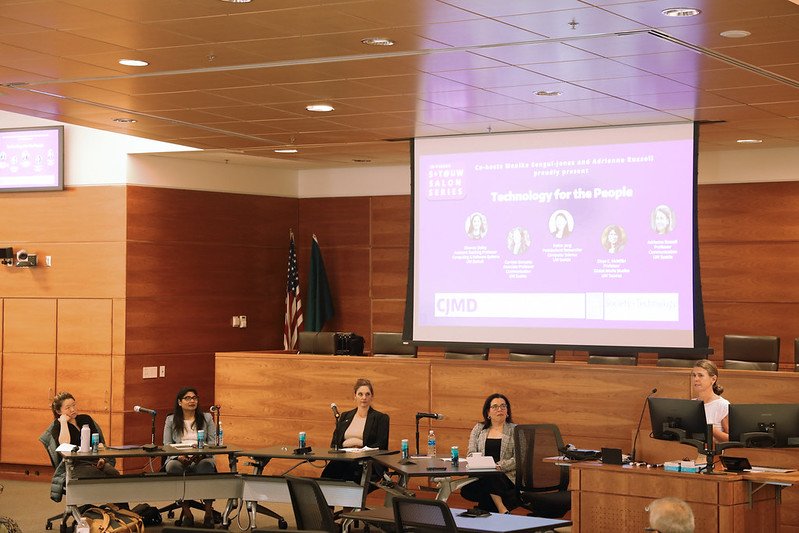UW Communication’s Center for Journalism, Media, and Democracy (CJMD) recently co-hosted “Technology for the People,” a UW Salon with Society + Technology at UW (S+T).
This salon brought together prominent voices from all three UW campuses in the technology, media, and communication fields to discuss efforts to promote digital equity and information access in the Puget Sound region.
Salons are part of Society + Technology at UW’s community programming, which aims to explore a variety of issues and perspectives on emerging technologies. Salons are presented as intellectual discussions to cultivate meaningful collaborations among S+T affiliates and community members.
This event featured speakers across multiple disciplines: Dharma Dailey (Computing & Software Systems, UW Bothell), Carmen Gonzalez (Communication, UW Seattle), Esther Jang (Computer Science, UW Seattle), and Divya C. McMillin (Global Media Studies, UW Tacoma).
Salon co-hosts Monika Sengul-Jones (Director of Strategy & Operations, S+T) and Adrienne Russell (co-director, CJMD) emphasized the importance of the salons as creating a space for cross-disciplinary connection.
“This was a fantastic conversation that really showcased the deeply important and engaged work on how digital technologies are developed and used [that] UW researchers are doing across campuses and disciplines,” Russell said.
“The impulse behind this, the reason to host it, is because the biggest challenges of our time–such as how to grapple with inequalities and the role of technologies and media ownership–are best addressed through cross-disciplinary conversations,” Sengul-Jones added. “This salon was proof of concept for this format, and is one of several Society + Technology at UW community programs that I’m leading to foster conversation. What made this salon a success was both cross-disciplinarity and intergenerational form. Everyone had slightly different disciplinary homes and methods for asking similar questions.”
Part of that success was the audience’s enthusiastic participation in the discussion. The salon hosted a diverse audience of over 100 registrees–from graduate students and faculty, to government workers, and more. “Many in the audience were curious, concerned citizens coming to gain insight from our university,” Sengul-Jones said. “I see the salon as a service to our public.” It was an event, as the salon’s title suggests, “for the people.”
“It’s easy to forget in this current moment that technologies are made by people and they could be made and used in ways that support rather than undermine our connections to one another,” Russell said. “It is particularly important at this current political moment–when the tech industry is directly implicated in attacks on democracy–that we open up space to talk about not just what is happening, but also about how we might create technologies and tech systems that support rather than break communities and publics.”

